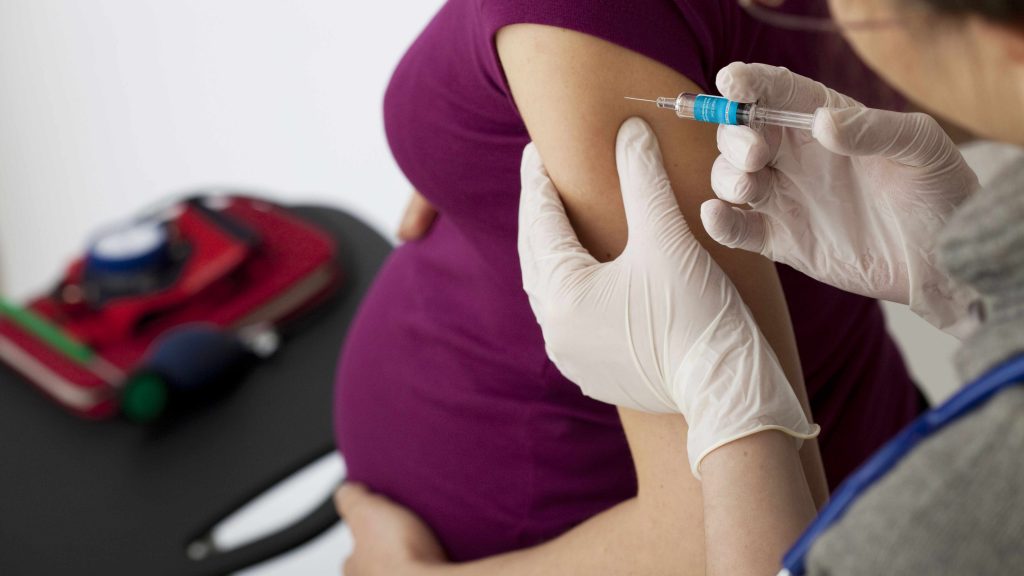
Flu season usually starts in the fall, peaks during the height of winter and tapers around spring. Other respiratory illnesses, including respiratory syncytial virus, enteroviruses, the common cold and COVID-19, also can spread during flu season and cause flu-like symptoms.
One of the best ways to protect yourself from illness is to get a seasonal flu shot.
Vaccination is vital for those at higher risk of complications, including pregnant women, says Dr. Thomas Howell Jr., an OB-GYN at Mayo Clinic Health System.
"We know that if you're pregnant, your risk of getting sicker from influenza, from COVID-19, from any kind of pulmonary respiratory disease for various physiologic reasons is much higher," says Dr. Howell.
Watch: Dr. Thomas Howell talks about pregnancy and the flu
Journalists: Broadcast-quality video is available in the downloads at the end of the post. Please courtesy: Mayo Clinic News Network. Name super/CG: Thomas Howell Jr., M.D./OB-GYN/Mayo Clinic.
The benefits of vaccination can protect both mother and baby. A study on influenza vaccine effectiveness found that flu vaccination reduced hospitalization during pregnancy by up to 40%. Antibodies developed from a flu shot during pregnancy pass through the placenta (and through breast milk if breastfed). Those antibodies protect the baby from the flu after birth.
Dr. Howell says everyone eligible should get a flu shot, and pregnant women need to get vaccinated.
The flu vaccine is safe for both mother and baby, he says. Pregnant women should get the flu shot made from an inactivated virus and not the flu nasal spray vaccine, which is a live vaccine.
"It's not a virus that the baby can get infected by, it doesn't give you the flu, and it doesn't make you sick, although occasionally you can have some mild aches or arm soreness," he says.
The Centers for Disease Control and Prevention (CDC) recommends annual flu vaccination for everyone 6 months or older. Vaccination can reduce your risk of the flu and its severity, lowering the risk of having severe illness from the flu and needing hospitalization.
"The point of those immunizations is to keep you from getting sicker, especially very gravely ill, and we know that if you're pregnant, your risk is much higher," says Dr. Howell.
Dr. Howell says there are physiologic reasons for those who are pregnant to be concerned about having a worse outcome from the flu if they are not vaccinated.
"It tends to be an immunocompromised health status, just from being pregnant. If you think about it, you have another human growing inside you that your body needs not to reject," says Dr. Howell. "Your body puts your immunity down a little bit. Another reason, from a respiratory standpoint, you physiologically already breathe faster. That has to do with chemicals in your blood and some anatomic changes as the baby grows."
Tips to stay healthy during flu season
Along with vaccination, Dr. Howell offers these tips to stay healthy during flu season:
- Get adequate rest.
- Eat a healthy diet, especially fruits and vegetables.
- Get regular exercise.
- Stay home when sick.
- Keep your children home when they are sick.
- Avoid others if they are sick.
- Follow your pregnancy plan.
Know your immunization status
"If you're not immune or have not had chickenpox, you want to stay away from people that have active shingles because they're possibly shedding chickenpox virus," says Dr. Howell. "It's worth knowing your immunization status for measles, mumps, rubella, chickenpox — those (types of) diseases — because we are starting to see a little bit of a rise again in those diseases with the lack of immunization that's occurred over the last few years."
The CDC recommends everyone get their flu shot by the end of October. Pregnant women also are encouraged to get their COVID-19 vaccination and booster when eligible.
The COVID-19 vaccine also has offered some protection to the baby after birth, says Dr. Howell.
"Infants are vulnerable, particularly to respiratory disease. And so, getting vaccinated as a pregnant patient not only helps you not get sick, but also helps your baby not get sick."
Related posts:
- Expect a different flu season: Why you’ll want to be vaccinated for flu.
- Cold, flu or allergies? Overlapping symptoms make it a challenge to know when to seek medical care.
For the safety of its patients, staff and visitors, Mayo Clinic has strict masking policies in place. Anyone shown without a mask was recorded prior to COVID-19 or recorded in an area not designated for patient care, where social distancing and other safety protocols were followed.







